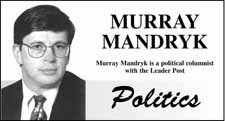The reason why 2010 might go down as Premier Brad Wall's best year has everything to do with the fact that it wasn't exactly smooth sailing for his Saskatchewan Party government.
Admittedly, the bar for what makes a great year was set pretty high for Wall in his first year in 2008 when everything he touched seemed to turn to gold. Oil came close to $150 a barrel and gas and oil lease land sales were at record highs. Potash was selling for $1,000 a tonne and its revenue topped a billion dollars.
Even agriculture saw record income from high prices and a high-yield, high quality crop.
But for as delighted as Saskatchewan people were with the province's success in 2008, it wasn't exactly cause to admire Wall's leadership. Rather, most assumed Wall had just somehow lucked into financial success. And no one was celebrating Wall's leadership when the province's fortunes took a turn for the worse in 2009.
Admittedly, 2009 was not exactly a disastrous year by Saskatchewan's historical standards of the Dirty Thirties, the economic downturn of the 1960s, the droughts of the late 1980s or the fiscal mess of the early 1990s. In fact, compared with the rest of world that suffered from the stock market crash and downturn in October 2008, Saskatchewan fared rather well because of relatively high oil prices.
But the slide in potash revenues - largely due to the loss of offshore markets because Saskatchewan potash industry's attempts to keep prices too high - was a huge blow to Wall's government. It was an especially tough blow because the Premier seemed ill prepared to deal with the ups and downs that often are the Saskatchewan economy. After having to scale back the building of rural nursing homes and to postpone planned property tax relief and increases to municipal revenue sharing grants, there were those that questioned Wall's leadership.
Fast forward to today - the end of 2010 - and there are few such doubts about Wall's leadership now. While 2010 was neither a particularly bad nor good year, it was a year that certainly tested Brad Wall's mettle. By all measure, Wall has a great year.
The first such adversity came in the form of the excessive winter snow, spring rains and flash storms and wet fall. About 30 per cent of the land was left unseeded while fall rains and early frosts did considerable damage to any crop that did get into the ground. And in between the spring and fall rains came severe storms that did considerable damage.
Of course, not everyone is completely pleased with the way Wall and his government provided compensation for these natural disasters. But what most saw is a Premier doing his best to help, which included tours of flood ravaged communities like Maple Creek even when there were no TV cameras around to raise suspicions that this was just 小蓝视频 done for publicity.
But the greatest moment for Wall in 2010 - and possibly in his political career - came during his handling of the BHP Billiton attempted hostile takeover of PotashCorp.
Wall not only had to go against some of his natural instincts as a free-enterpriser (for which he drew considerable criticism). He also had to do battle with his federal cousins who - left to their own devices - would have clearly approved the BHP Billiton as a matter of course. Essentially, Wall took on both one of the biggest companies in the world and the federal company and won.
That he was able to emerge from this tough, tough situation as a respected national-calibre leader says much.
We judge our political leaders not by the good times, but by how they handle the tough situations. And Wall came through with flying colours in 2010.
Murray Mandryk has been covering provincial politics for over 15 years.




